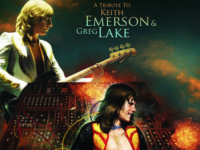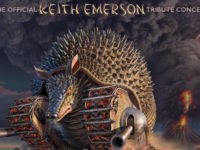A lot of thoughts flooded my head when I started listening to A Tribute to Keith Emerson and Greg Lake. Why not individual tribute albums? How do you mix iconic and lesser-known songs by these two prog legends? How does Billy Sherwood of Yes ever have time to do this concept justice?
Not having interviewed Sherwood recently, I can only speculate on the answer to my first question. However, the combination of 11 songs from Emerson Lake and Palmer, King Crimson and their solo careers ends up working just fine. While predictable, they represent Keith Emerson and Greg Lake well.
“21st Century Schizoid Man” starts things off in fine, bombastic fashion. Todd Rundgren tears into the King Crimson classic, with help from Brian Auger. The organ solo is a killer and Rundgren’s vocals match the intensity of the rhythm section. Is it Sherwood on bass and drums? “A Time and a Place,” from Emerson Lake and Palmer’s Tarkus, features Leslie Hunt on vocals and Derek Sherinian of Dream Theater fame on keys. Hunt’s vocals seem made for the song. Sheridan doesn’t stray too far from the Emerson original, however, making the song a fine recreation, but little more.
“The Sheriff” finds Billy Sherwood taking on the vocals and David Sancious handling organ and piano. Sancious, who provided one of the many stand-out performances on the Sherwood-produced A Life In Yes: The Chris Squire Tribute, brings his “A” game to “The Sheriff.” This combination works well. The percussion and drums add zeal, aptly supporting Sherwood’s voice, while Sancious’ jazz-infused touches give listeners new textures.
Yes frontman Jon Davison seems like an unlikely vocalist for Emerson Lake and Palmer’s “C’est La Vie.” The song does not demand the high part of his range. Yet Davison, ever the craftsman, provides one of the highlights on A Tribute to Keith Emerson and Greg Lake. Billy Sherwood’s inclusion of a rhythm backing gives a touch of muscle to the classic, while Larry Fast provides a tidy orchestral interlude.
Patrick Moraz gets a crack at the quirky “Hoedown,” another ELP classic. The former Yes keyboardist recreates the original with few deviations, but the song cries for Moraz to step out from the paint-by-numbers approach of the arrangement. Elsewhere, Toto synth wizard Steve Porcaro and Curved Air vocalist Sonja Kristina take a crack at Greg Lake’s “Still … You Turn Me On.” Kristina’s vocals add an entirely different dimension to the song while Porcaro, the master of subtle shades, flows effortlessly as the rhythmic aspects of his playing tie into the timbre of Kristina’s voice.
Asia performed “Lucky Man” during a tour last year which included Bumblefoot on guitar and vocals, giving Geoff Downes a chance to add his stamp on the iconic Moog solo by Keith Emerson. He returns to the song for A Tribute to Keith Emerson and Greg Lake. Wishbone Ash’s Martin Turner handles the vocals in workmanlike fashion, as Downes takes a different approach to the structure and sound of the synthesizer. The results aren’t exactly a reconstruction of the original, but it’s still a worthy tribute.
“Fanfare for the Common Man” is a must for any tribute to Keith Emerson and Greg Lake. Keith’s son Aaron Emerson and his grandson Ethan Emerson deliver a version with all the passion and precision one would expect from heirs to the keyboard wizard. Arthur Brown, who was the featured vocalist for Carl Palmer’s ELP Legacy, returns to handle “Karn Evil 9: 1st Impression Part 2.” Brown’s vocal is very – ah, English. He supplies an element of class, yet he also plays the ring master’s role well. Jordan Rudess adds to the drama of the song with a couple of hard-rocking solos that bring the album to a fitting end.
Those who purchase the compact-disc version of A Tribute to Keith Emerson and Greg Lake also get a bonus track featuring the Royal Philharmonic Orchestra performing “ELP Suite: Tarkus / From The Beginning / Tarkus (Reprise),” but Billy Sherwood was able to give listeners just enough of Keith Emerson and Greg Lake to satisfy.
As for the final of my three questions, remind me to ask Sherwood the next time I interview him.
- Nosotros, “Mentiras” (2024): One Track Mind - April 10, 2024
- Nick Finzer, Christian Fabian, Rachel Z + Others: Five for the Road - April 5, 2024
- Terry Blade on ‘Ethos: Son of a Sharecropper’: Something Else! Interview - March 10, 2024




